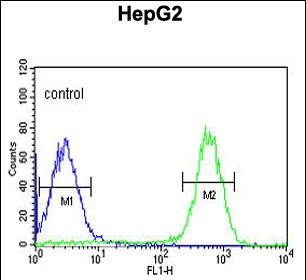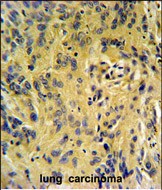


| WB | 1/1000 | Human,Mouse,Rat |
| IF | 咨询技术 | Human,Mouse,Rat |
| IHC | 1/100-1/500 | Human,Mouse,Rat |
| ICC | 技术咨询 | Human,Mouse,Rat |
| FCM | 1/10-1/50 | Human,Mouse,Rat |
| Elisa | 咨询技术 | Human,Mouse,Rat |
| Aliases | Calcineurin B homologous protein 3, Tescalcin, TSC, TESC, CHP3 |
| Entrez GeneID | 54997 |
| WB Predicted band size | 24.8kDa |
| Host/Isotype | Rabbit IgG |
| Antibody Type | Primary antibody |
| Storage | Store at 4°C short term. Aliquot and store at -20°C long term. Avoid freeze/thaw cycles. |
| Species Reactivity | Human, Mouse |
| Immunogen | This TESC antibody is generated from rabbits immunized with a KLH conjugated synthetic peptide between 88-116 amino acids from the C-terminal region of human TESC. |
| Formulation | Purified antibody in PBS with 0.05% sodium azide. |
+ +
以下是关于TESC(Tescalcin)抗体的3篇代表性文献概览:
---
1. **文献名称**:*Tescalcin regulates hematopoietic stem cell maturation through the expression of MEF2C*
**作者**:Wang Y, et al.
**摘要**:该研究利用TESC抗体检测Tescalcin在造血干细胞中的表达,发现其通过调控MEF2C转录因子影响细胞分化,为血液系统疾病机制提供了新见解。
2. **文献名称**:*Tescalcin interacts with the sodium/hydrogen exchanger NHE1 and modulates intracellular pH in cardiomyocytes*
**作者**:Li X, et al.
**摘要**:通过TESC抗体的免疫共沉淀实验,揭示Tescalcin与心肌细胞中的NHE1离子通道互作,调控细胞内pH值及心脏发育过程。
3. **文献名称**:*Epigenetic silencing of Tescalcin induces drug resistance in colorectal cancer*
**作者**:Zhang R, et al.
**摘要**:研究使用TESC抗体评估结直肠癌组织中Tescalcin的蛋白表达水平,发现其表观遗传沉默与化疗耐药性相关,提示其作为潜在治疗靶点。
---
以上文献展示了TESC抗体在干细胞分化、离子通道互作及癌症耐药性研究中的应用,均通过该抗体检测目标蛋白表达或相互作用机制。如需具体文献年份或期刊,可进一步补充数据库检索。
**Background of TESC Antibody**
The TESC (tescalcin) antibody is a research tool targeting tescalcin, a calcium-binding protein encoded by the *TESC* gene. Tescalcin plays critical roles in cellular processes such as differentiation, proliferation, and ion transport regulation. It interacts with sodium/hydrogen exchangers (NHEs) and modulates intracellular pH, influencing cell cycle progression and apoptosis.
Interest in TESC antibodies stems from tescalcin's involvement in diseases, particularly cancer. Overexpression of tescalcin has been linked to tumorigenesis in malignancies like hepatocellular carcinoma, colorectal cancer, and leukemia, where it promotes cell survival and chemoresistance. Conversely, reduced tescalcin levels are observed in neurodegenerative disorders, suggesting its context-dependent roles.
TESC antibodies are widely used in techniques like Western blotting, immunohistochemistry (IHC), and immunofluorescence (IF) to detect tescalcin expression in tissues or cell lines. These antibodies aid in elucidating its tissue-specific distribution, subcellular localization (e.g., cytoplasmic or membrane-associated), and dysregulation in pathological states.
Research utilizing TESC antibodies has also explored its regulatory mechanisms, including epigenetic control and post-translational modifications. As tescalcin emerges as a potential biomarker or therapeutic target, TESC antibodies remain vital for advancing understanding of its physiological and pathological functions. Their specificity and validation across experimental models are crucial for ensuring reproducibility in studies linking tescalcin to human diseases.
×